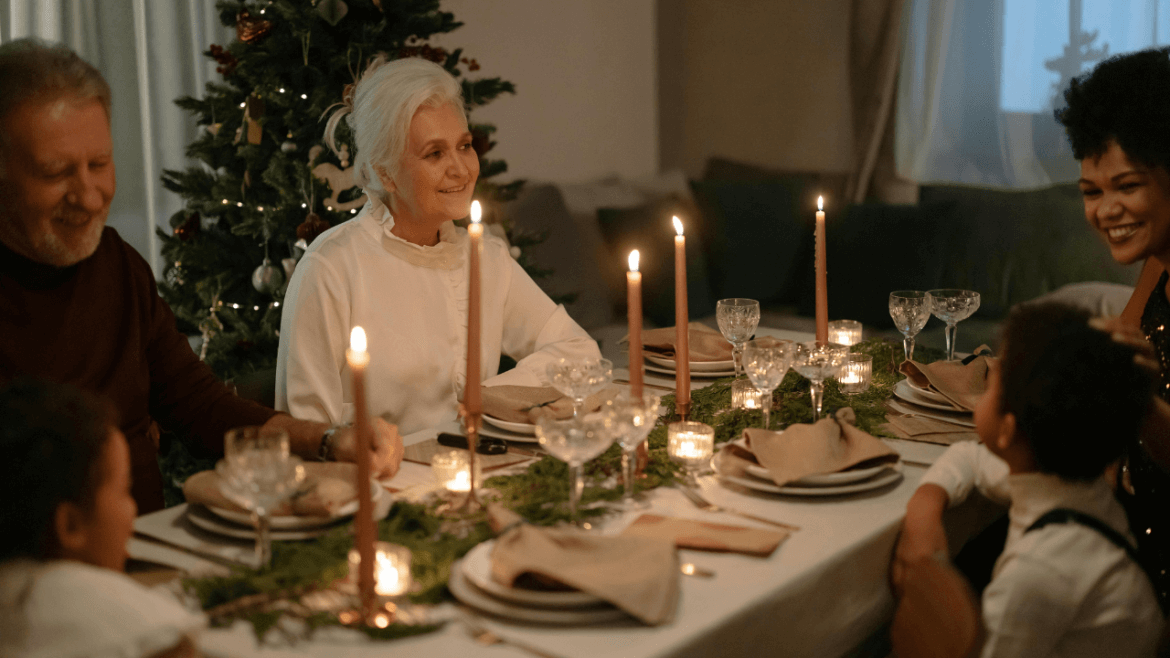How Can A Senior With Dementia Celebrate Christmas?
Did you know that Leading Edge Senior Care has a Dementia Support Group? We meet monthly in Mesa. For more details <click here>
How Can A Senior With Dementia Celebrate Christmas?
Christmas is a time of joy, love, and connection, but for seniors with dementia, it can also bring challenges. Families often worry about how to create a festive atmosphere while ensuring comfort and stability for their loved ones.
Understanding their needs and limitations is the key to making this holiday meaningful and enjoyable for everyone.
Understanding the Impact of Dementia During the Holidays
Dementia affects memory, cognition, and behavior, which can make traditional holiday celebrations overwhelming. Crowds, noise, and sudden changes in routine can trigger anxiety or confusion. Seniors with dementia often feel disoriented in unfamiliar settings, making it vital to adjust the holiday plans to suit their unique needs.
While it may be tempting to include them in every festive activity, simplicity often works best. A calm and structured environment can help reduce stress. Creating a balance between tradition and adaptability is the foundation for a joyful celebration.
The Importance of Familiarity
Familiarity plays a vital role in helping seniors with dementia feel safe and connected. Decorating their living space with familiar ornaments, family photos, and gentle lights can evoke positive memories without causing overstimulation. Playing soft holiday music from their younger years may also spark joy and recognition.
When planning activities, choose those that are meaningful yet uncomplicated. Baking cookies, watching a favorite Christmas movie, or sharing family stories can help them feel engaged. These small moments, grounded in familiarity, can create lasting memories for everyone involved.
Creating a Dementia-Friendly Celebration
Celebrating Christmas with a senior who has dementia requires thoughtful planning. Begin by selecting a time of day when they are most alert and relaxed. For many seniors, morning or early afternoon works best. Keep the guest list small to avoid overwhelming them, and ensure that their immediate surroundings remain peaceful.
Simplify traditional activities without losing their essence. For instance, if they once enjoyed trimming the tree, provide pre-arranged decorations and let them place a few ornaments. The goal is to involve them in ways that are both meaningful and manageable.
Food is another significant part of Christmas. Serve familiar dishes they’ve always loved, while keeping textures and flavors easy to eat. Avoid introducing new or complex recipes that might confuse or upset them. If possible, sit together at a quiet table where everyone can connect through conversation and shared laughter.
Maintaining Routine and Structure
Routine is a cornerstone for managing dementia, even during special occasions. Sticking to their usual schedule for meals, medication, and rest helps prevent unnecessary stress. While Christmas may bring excitement, it’s important to maintain a sense of normalcy.
If you plan to attend a church service or a family gathering, consider their limitations. Short visits to familiar places may be enjoyable, but prolonged outings can lead to fatigue and agitation. Always have a quiet space available where they can retreat if needed.
Strengthening Emotional Connections
The emotional bond between a senior with dementia and their family is perhaps the most profound gift of the holiday season. While they may not remember every detail, they will feel the love and warmth shared during these moments.
Physical touch, such as holding hands or giving a gentle hug, can communicate more than words. Simple activities like singing carols together or reading a favorite holiday story can create a sense of togetherness.
Be patient and present in every interaction. Focus on what they can do, rather than what they can’t. Celebrate their achievements, no matter how small, and show appreciation for their presence.
Reflecting on the True Meaning of Christmas
For families affected by dementia, Christmas becomes a time to cherish the present. While it may differ from past celebrations, the essence of love, kindness, and gratitude remains the same. Embracing these values allows everyone to find joy, even amidst challenges.
It’s also a time to acknowledge the caregivers who work tirelessly to support their loved ones. Offering them a moment of respite or including them in the festivities can make a world of difference.
Moving Forward with Hope
As the holiday season approaches, remember that adapting to the needs of a senior with dementia is not about losing tradition. It’s about transforming it into something meaningful and inclusive. Each smile, laugh, and shared moment becomes a testament to the enduring spirit of Christmas.
With thoughtful planning and a compassionate approach, the holiday can be a source of joy for both the senior and their family. In celebrating together, you create a legacy of love that transcends the challenges of dementia.

